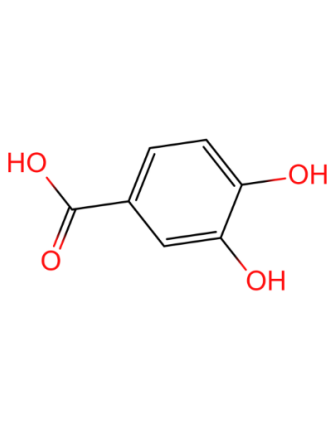
Protocatechuic acid
CAS NO.99-50-3
规格:
作用:
简单介绍:Chemical formula: C7H6O4 Molecular weight: 154.12
Protocatechuic acid (PCA) is an organic compound with the molecular formula (HO)2C6H3COOH and molecular weight 154.12. It is a white to brown crystalline powder that changes color in air. It is found in the leaves of Stenoloma chusanum (L.) Ching and Ilex chi-nensis Sims in the Holly family.
Protocatechuic acid (PCA), or 3,4-Dihydroxybenzoic acid, is a phenolic acid naturally found in many vegetables and fruits, and is the active ingredient in many Chinese herbal medicines. Protocatechuic not only has pharmacological activities such as antiplatelet aggregation, reducing myocardial oxygen consumption, improving myocardial oxygen tolerance, slowing down heart rate, antibacterial and analgesic, but also has antioxidant, antitumor and neuroprotective effects.
Protocatechuic acid (PCA) is an important natural active substance with various pharmacological activities such as antiplatelet aggregation, reducing myocardial oxygen consumption, antibacterial and analgesic. Recent studies have identified many new pharmacological effects of PCA, such as antioxidant, anticancer and mediating apoptosis of tumor cells. Protocatechuic acid has inhibitory effects on Staphylococcus albicans and Staphylococcus aureus, S. pneumoniae, Haemophilus influenzae, Pseudomonas aeruginosa, Escherichia coli and Proteus mirabilis. Staphylococcus aureus infection in mice resulted in a 30% reduction in mortality.